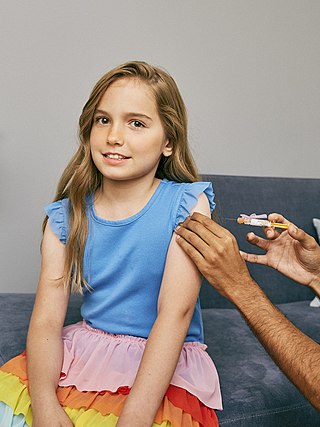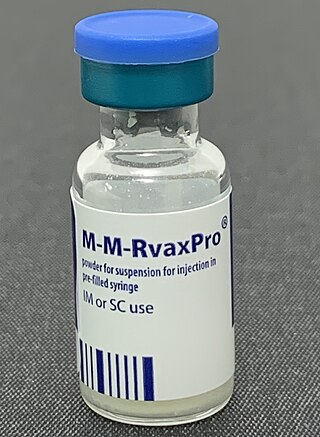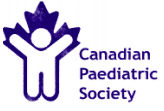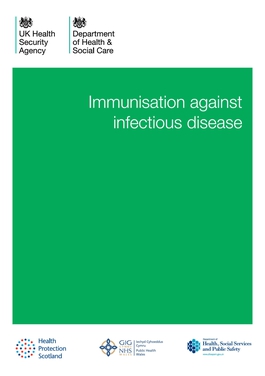Related Research Articles

Vaccination is the administration of a vaccine to help the immune system develop immunity from a disease. Vaccines contain a microorganism or virus in a weakened, live or killed state, or proteins or toxins from the organism. In stimulating the body's adaptive immunity, they help prevent sickness from an infectious disease. When a sufficiently large percentage of a population has been vaccinated, herd immunity results. Herd immunity protects those who may be immunocompromised and cannot get a vaccine because even a weakened version would harm them. The effectiveness of vaccination has been widely studied and verified. Vaccination is the most effective method of preventing infectious diseases; widespread immunity due to vaccination is largely responsible for the worldwide eradication of smallpox and the elimination of diseases such as polio and tetanus from much of the world. However, some diseases, such as measles outbreaks in America, have seen rising cases due to relatively low vaccination rates in the 2010s – attributed, in part, to vaccine hesitancy. According to the World Health Organization, vaccination prevents 3.5–5 million deaths per year.

The MMR vaccine is a vaccine against measles, mumps, and rubella, abbreviated as MMR. The first dose is generally given to children around 9 months to 15 months of age, with a second dose at 15 months to 6 years of age, with at least four weeks between the doses. After two doses, 97% of people are protected against measles, 88% against mumps, and at least 97% against rubella. The vaccine is also recommended for those who do not have evidence of immunity, those with well-controlled HIV/AIDS, and within 72 hours of exposure to measles among those who are incompletely immunized. It is given by injection.
An adverse effect is an undesired harmful effect resulting from a medication or other intervention, such as surgery. An adverse effect may be termed a "side effect", when judged to be secondary to a main or therapeutic effect. The term complication is similar to adverse effect, but the latter is typically used in pharmacological contexts, or when the negative effect is expected or common. If the negative effect results from an unsuitable or incorrect dosage or procedure, this is called a medical error and not an adverse effect. Adverse effects are sometimes referred to as "iatrogenic" because they are generated by a physician/treatment. Some adverse effects occur only when starting, increasing or discontinuing a treatment. Adverse effects can also be caused by placebo treatments . Using a drug or other medical intervention which is contraindicated may increase the risk of adverse effects. Adverse effects may cause complications of a disease or procedure and negatively affect its prognosis. They may also lead to non-compliance with a treatment regimen. Adverse effects of medical treatment resulted in 142,000 deaths in 2013 up from 94,000 deaths in 1990 globally.
The Vaccine Adverse Event Reporting System (VAERS) is a United States program for vaccine safety, co-managed by the U.S. Centers for Disease Control and Prevention (CDC) and the Food and Drug Administration (FDA). VAERS is a postmarketing surveillance program, collecting information about adverse events that occur after administration of vaccines to ascertain whether the risk–benefit ratio is high enough to justify continued use of any particular vaccine.

Human papillomavirus (HPV) vaccines are vaccines that prevent infection by certain types of human papillomavirus (HPV). Available HPV vaccines protect against either two, four, or nine types of HPV. All HPV vaccines protect against at least HPV types 16 and 18, which cause the greatest risk of cervical cancer. It is estimated that HPV vaccines may prevent 70% of cervical cancer, 80% of anal cancer, 60% of vaginal cancer, 40% of vulvar cancer, and show more than 90% efficacy in preventing HPV-positive oropharyngeal cancers. They additionally prevent some genital warts, with the quadrivalent and nonavalent vaccines that protect against HPV types HPV-6 and HPV-11 providing greater protection.
A vaccine adverse event (VAE), sometimes referred to as a vaccine injury, is an adverse event caused by vaccination. The World Health Organization (WHO) knows VAEs as Adverse Events Following Immunization (AEFI).
The MMRV vaccine combines the attenuated virus MMR vaccine with the addition of the chickenpox vaccine or varicella vaccine. The MMRV vaccine is typically given to children between one and two years of age.

The Canadian Paediatric Society (CPS) is a national association of paediatricians.
A vaccination policy is a health policy adopted in order to prevent the spread of infectious disease. These policies are generally put into place by State or local governments, but may also be set by private facilities, such as workplaces or schools. Many policies have been developed and implemented since vaccines were first made widely available.
The Australian Vaccination-risks Network Inc., formerly known as the Australian Vaccination-Skeptics Network (AVsN), and before that known as the Australian Vaccination Network (AVN), is an Australian anti-vaccination pressure group registered in New South Wales. As Australia's most controversial anti-vaccination organisation, it has lobbied against a variety of vaccination-related programs, downplayed the danger of childhood diseases such as measles and pertussis, championed the cause of alleged vaccination victims, and promoted the use of ineffective alternatives such as homeopathy.

The Northern Rivers Vaccination Supporters (NRVS) is a vaccination advocacy group formed in 2013 by people who were concerned about low vaccination rates in the Northern Rivers region of the Australian state of New South Wales. Rachel Heap, one of the group's core administrators, has said the organization's primary goal is to spread the word that people shouldn't be afraid of vaccines, but instead, "you should be amazed at how extraordinary they are as a public health measure".

Roslyn Judith "Judy" Wilyman is an Australian anti-vaccination activist who came to prominence following the controversial award of a humanities PhD titled "A critical analysis of the Australian government's rationale for its vaccination policy" by University of Wollongong. The thesis came under heavy criticism from multiple directions, including medical professionals, due to claims within the thesis, including advancing a conspiracy theory whereby the World Health Organization (WHO) and the pharmaceutical industry supposedly conspire to promote vaccinations in the absence of evidence of safety and efficacy. The awarding of the degree created questions about the standards being applied and whether or not the thesis supervisors and examiners had sufficient knowledge to oversee the research, and led to calls for the university to review the doctorate. A number of individuals and medical organisations – including academics and researchers from other parts of the University of Wollongong – spoke out against the findings of the thesis, emphasising the need for vaccinations in order to prevent serious disease; and the University of Wollongong was criticised for a perceived lack of transparency in their doctoral process and an alleged failure to uphold standards of scholarship.
Nicola Mary Turner is a New Zealand public health advocate who is a Professor at the University of Auckland and Medical Director of the Immunisation Advisory Centre, an organisation that advises the New Zealand medical profession and the New Zealand Government. She has contributed to advisory committees for the New Zealand Ministry of Health, is a spokesperson for the Child Poverty Action Group and works in general practice. Much of her research and outreach has focused on improving immunisation coverage and closing equity gaps for the national schedule vaccine delivery in New Zealand and she has commented publicly on these issues during COVID-19 in New Zealand.
Helen Aspasia Petousis-Harris is a New Zealand vaccinologist and associate professor in the Department of General Practice and Primary Health Care at the University of Auckland. She has been involved in research related to vaccination in New Zealand since 1998, with her main areas of focus being vaccine safety and effectiveness. Petousis-Harris has had a variety of lead roles in New Zealand and international organisations that focus on vaccination and is a regular media spokesperson in this field, especially during the COVID-19 pandemic.

The general COVID-19 vaccination in Australia program began on 22 February 2021 in response to the COVID-19 pandemic, with the goal of vaccinating all willing people in Australia before 2022. Front-line workers and aged care staff and residents had priority for being inoculated, before a gradual phased release to less-vulnerable and lower-risk population groups throughout 2021. The Therapeutic Goods Administration (TGA) approved four vaccines for Australian use in 2021: the Pfizer–BioNTech vaccine on 25 January, the Oxford–AstraZeneca vaccine on 16 February, Janssen vaccine on 25 June and the Moderna vaccine on 9 August. Although approved for use, the Janssen vaccine was not included in the Australian vaccination program as of June 2021.
The Immunisation Advisory Centre (IMAC) is a New Zealand-wide organisation which provides information and training about immunization and vaccine-preventable diseases to health care professionals, government bodies, and individuals. It co-ordinates the nation's immunisation programmes, policy advice and research. It was launched in 1997, and is based at The University of Auckland.
Dr. Shelley Deeks, MD, MHSc, FRCPC, FFAFPM, is a Canadian public health expert who is the chair of the National Advisory Committee on Immunization. Her advertised "specialities include communicable disease control, outbreak investigations, vaccine safety, epidemiology and program evaluation." She is a fellow of the Royal College of Physicians of Canada and the Australian Faculty of Public Health Medicine. Deeks was the executive lead in Ontario's COVID-19 pandemic response in 2020 in her role at Public Health Ontario.
The Australian Technical Advisory Group on Immunisation (ATAGI) is a technical advisory group of the Australian Government. As part of the Department of Health, ATAGI provides advice to the Minister of Health on the immunisation program of Australia and related matters, including the strength of evidence pertaining to existing, new, and emerging vaccines.

Immunisation against infectious disease, popularly known as The Green Book, provides information on vaccines for vaccine-preventable diseases. It acts as a guide to the UK's vaccination schedule for health professionals and health departments that give vaccines in the United Kingdom.
Julie Leask or Julie-Anne Leask is an Australian social scientist and professor in the Susan Wakil School of Nursing and Midwifery, Faculty of Medicine and Health, University of Sydney. Leask is a leading researcher on social and behavioural aspects of vaccination and infectious disease prevention. Leask’s research focuses on vaccine uptake, communication, strengthening vaccination programs and policy. Leask’s flagship project is Sharing Knowledge About Immunisation (SKAI) - a vaccination communication package designed to improve vaccination conversations between parents and health care workers. Additionally, Leask is an advisor to the World Health Organization (WHO) on vaccine acceptance and demand issues and was the chair of the WHO Measuring Behavioural and Social Drivers of Vaccination working group (2018-2022).
References
- ↑ "National Centre for Immunisation Research and Surveillance (NCIRS)". Healthdirect Australia . July 2019. Retrieved October 9, 2021.
- 1 2 3 4 "National Centre for Immunisation Research and Surveillance of Vaccine Preventable Diseases (NCIRS)". World Health Organization . Retrieved October 9, 2021.
- ↑ "Our history". National Centre for Immunisation Research and Surveillance. Retrieved October 9, 2021.
- ↑ National Immunisation Strategy for Australia 2019–2024 (PDF) (Report). National Immunisation Program. 2018. Retrieved October 9, 2021.
- 1 2 3 4 NCIRS 20th Anniversary (PDF) (Report). National Centre for Immunisation Research and Surveillance. 2017. Retrieved October 9, 2021.
- ↑ Finkel, Elizabeth (14 September 2021). "Adverse reactions: Guillain Barre, TTS and the fine mesh net". Cosmos. Retrieved 10 October 2021.
- ↑ "Our history". AusVaxSafety: Australia's active vaccine safety system. Retrieved 10 October 2021.
- ↑ "Mass-gathering medicine". University of Sydney. Retrieved 10 October 2021.